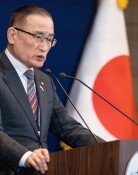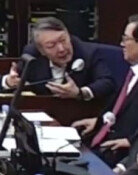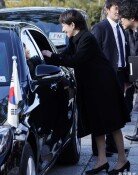Early learning causes problems
Early learning causes problems
Posted February. 04, 2001 18:59,
Elementary school students are competing to enter university. The early learning boom that has taken hold in Seoul's Kangnam district is pushing 3rd and 4th grade elementary school students to learn middle school English and math at private institutes. Parents are concerned that their children are falling behind others. But can students who have already completed middle school-level classes beforehand truly excel when they enter middle school. Private institute tutors believe students will excel. However, teachers and experts are worried the public school education system may become obsolete. --Ed.
In front of a private institute in Kangnam at 8:10 p.m. on Nov. 1, a 6th grader holding a bag and lunchbox said, "I have to receive additional tutoring for math at home." The student had studied every morning during the vacation and then attended a private institute from 2:00 p.m. to 6:00 p.m., finally finishing the day with additional tutoring at night.
The number of elementary school students studying ahead of their curriculum level through private institutes seems to be getting out of control.
Recently, there have been students who started early learning in the 4th grade and completed the middle school curriculum by the 6th grade. The increase in early learning threatens to create a situation in which students lose interest in studying during school hours. This could eventually lead to the collapse of the public school system.
Realities:
The most active areas of early learning are Daechi-dong, Apgujong-dong in Kangnam-gu and parts of Banpo-dong, Socho-gu. Private academies in these areas were packed with primary school pupils who studied from 9:00 a.m. to 6:30 p.m. during the vacation and from 5:30 p.m. through 11:00 p.m. during the last semester. The academies held these pupils under strict controls, permitting them to leave only when they had passes. The cost to study at these private academies is roughly 350,000~450,000 won.
The traditional practice of exposing students to the first year middle school course in the last year of primary school is changing such that the first year middle school curriculum is is studied beginning in the 4th year of primary school. The third year middle school course is then learned during the winter vacation.
A 41-year-old teacher named Kim, in charge of a 5th grade class at a primary school in Daechi-dong said, ¡°Even the 3rd and 4th graders are learning middle school-level math and English. Most pupils in my class seem to have had early learning, except 5 or 6 who studied abroad during this vacation. I am worried about the pupils¡¯ worsening attitudes in class.¡±
A parent named Lee in Jamwon-dong, Socho-gu, who has a 6th grade daughter, said she was surprised at the fact that the mothers of her daughter¡¯s friends treated the names of good private academies as if they were secrets, adding ¡°Although the early learning is also popular in the provinces, the situation in Seoul is too much.¡±
An official of the Confederated Association of Private Academies in Seoul noted, ¡°After it was announced that private tutoring violated the constitution, early learning has been much more popular."
Problems and alternatives:
Educational specialists point out that enthusiasm for early education may precipitate the erosion of formal schooling, costing parents a lot of money. They said excessive prior education adversely affects children.
A professor at Seoul National University of Education said intensive learning emphasizes problem-solving and memorization, unaccompanied by independent thinking and critical ability.
A mathematics teacher at a Seoul middle school said pupils exposed to early education lack comprehensive faculties and lack the capability to solve applied knowledge questions. The policy study director of a teachers union reported that in Japan, private institutes joined together to oppose this kind of system on the grounds that it would destroy both schools and private institutes. He called for elastic management of curricula and greater power on the part of teachers to evaluate students.
Kim Kyoung-Dal dal@donga.com






![[사설]참 구차한 김병기 전 원내대표](https://dimg.donga.com/c/138/175/90/1/wps/NEWS/IMAGE/2026/01/13/133151454.1.jpg)
